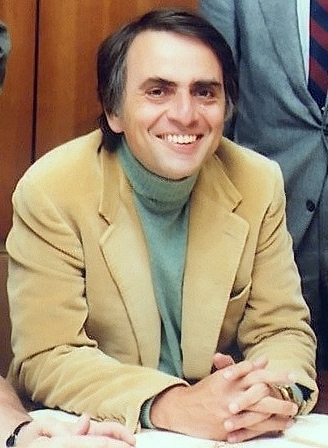
If you would like to know more about Carl Sagan and who he was, then I think that you might enjoy the Carl Sagan portal. He is perhaps best known for the TV series Cosmos that he presented, but that was simply the tip of the iceberg …
CARL SAGAN was the David Duncan Professor of Astronomy and Space Sciences and Director of the Laboratory for Planetary Studies at Cornell University. He played a leading role in the American space program since its inception. He was a consultant and adviser to NASA since the 1950’s, briefed the Apollo astronauts before their flights to the Moon, and was an experimenter on the Mariner, Viking, Voyager, and Galileo expeditions to the planets. He helped solve the mysteries of the high temperatures of Venus (answer: massive greenhouse effect), the seasonal changes on Mars (answer: windblown dust), and the reddish haze of Titan (answer: complex organic molecules).
For his work, Dr. Sagan received the NASA medals for Exceptional Scientific Achievement and (twice) for Distinguished Public Service, as well as the NASA ApolloAchievement Award. Asteroid 2709 Sagan is named after him. He was also awarded the John F. Kennedy Astronautics Award of the American Astronautical Society, the Explorers Club 75th Anniversary Award, the Konstantin Tsiolkovsky Medal of the Soviet Cosmonauts Federation, and the Masursky Award of the American Astronomical Society, (“for his extraordinary contributions to the development of planetary science…As a scientist trained in both astronomy and biology, Dr. Sagan has made seminal contributions to the study of planetary atmospheres, planetary surfaces, the history of the Earth, and exobiology. Many of the most productive planetary scientists working today are his present and former students and associates”).
From amongst the vast number of books he wrote, there is one that you might enjoy. It is his now famous book that has become a reference and primer for many of today’s skeptics – The Demon-Haunted World …
Sagan aims to explain the scientific method to laypeople, and to encourage people to learn critical and skeptical thinking. He explains methods to help distinguish between ideas that are considered valid science and those that can be considered pseudoscience.
The Full Turner – Sagan interview
Here is the full Turner-Sagan interview in which they talk about Nuclear weapons and also environmentalism.